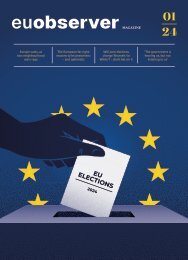Separatism: Making Europe stronger?
The 2014 edition of EUobserver's Regions & Cities magazine looks at separatist movements across Europe and its impact on the union.
The 2014 edition of EUobserver's Regions & Cities magazine looks at separatist movements across Europe and its impact on the union.
Create successful ePaper yourself
Turn your PDF publications into a flip-book with our unique Google optimized e-Paper software.
The police is investigating three men,<br />
two from Latgale, who did go. They<br />
raided homes in connection with the<br />
case and found small arms.<br />
Mitrofanov himself went to observe<br />
the Crimea “referendum” on<br />
independence in March.<br />
He says he saw no signs of Russian<br />
coercion, adding: “We sympathise with<br />
those who are close to us in language<br />
and culture … If Ukraine develops<br />
the same way that Latvia has been<br />
developing since its independence in<br />
1991, Russian speakers in Ukraine<br />
will be marginalised the same way<br />
we’ve been marginalised”.<br />
’UKRAINE SCENARIO<br />
IMPOSSIBLE’<br />
But even if Latgale looks like a soft<br />
target, Latvian authorities say it is not.<br />
“We live in times when any provocation<br />
cannot be excluded, but a ‘Ukrainian’<br />
scenario for Latvia is impossible”, its<br />
foreign minister, Edgars Rinkevics,<br />
says.<br />
“We have witnessed some pro-<br />
Russian organisations tying to provoke<br />
Latvian society. Those attempts were<br />
not successful”, she says.<br />
If they are right, then why does the<br />
Russkiy Mir hold so little appeal?<br />
Andis Kudors, a Latvian academic<br />
who specialises in Russian soft<br />
power, says the reasons are mostly<br />
economic.<br />
In Ukraine, public institutions were<br />
dysfunctional and insolvent. Elderly<br />
people in Crimea, for instance, had<br />
lousy pensions compared to Russia.<br />
But Latvia is better governed and<br />
offers more opportunities.<br />
“I was born in Latgale and this idea<br />
of autonomy is impossible”, Kudors<br />
says.<br />
“Even with the social problems in<br />
the region, there are no radicals<br />
who would fight to be part of Russia<br />
because people know that Russian<br />
living conditions, especially outside<br />
St Petersburg or Moscow, are much<br />
worse”.<br />
of social security and healthcare,<br />
with insecurity about tomorrow. That<br />
doesn’t depend on their nationality”,<br />
he says.<br />
Even Mitrofanov agrees.<br />
He warned that if incomes or language<br />
rights erode in the coming years then<br />
“people’s mood might change”.<br />
But he distanced himself from Dolgov,<br />
saying the Russian diplomat’s claim<br />
about liquidation of Russian schools<br />
is “not true.”<br />
“Autonomy is not interesting to<br />
Russians in Latgale because it won’t<br />
solve their problems, the poverty”, he<br />
adds.<br />
MORAL DIMENSION<br />
The economy is not everything,<br />
however.<br />
For Kudors, one side of life in Latgale’s<br />
mini-Russia is that Russian-Latvians<br />
there feel “happy, confident” in their<br />
identity despite the horror stories on<br />
Russian TV.<br />
Mitrofanov noted that after 23 years<br />
of living together, there is a “moral”<br />
dimension to Russian-Latvian society<br />
in the country.<br />
“We feel that we are Latvians, even if<br />
in our native language and culture we<br />
feel that we are Russians”, he says.<br />
His spokesman, Karlis Eihenbaums,<br />
notes that some Russian-Latvian<br />
activists have a new air of menace:<br />
“They don’t say it openly, but you can<br />
feel it: ‘If you don’t fulfill our dreams<br />
than Crimea-type things can happen<br />
here’.”<br />
But he points out the pro-Russia<br />
protests got almost no support. “If<br />
you can gather 40 or 50 people in a<br />
city of 1 million, that’s nothing”, he<br />
says, referring to Riga, also a majority<br />
Russian-Latvian town.<br />
Gunta Skrebele, a spokeswoman for<br />
the interior ministry, agrees.<br />
Nils Usakovs, the mayor of Riga and<br />
the head of Latvia’s largest Russian-<br />
Latvian party, Saskanas Centrs, says<br />
the same.<br />
Asked if any Russian-Latvians would<br />
like to live under Putin, he replies: “No.<br />
I don’t think so”.<br />
His main concern about the Ukraine<br />
war is not that it will deepen divisions<br />
in Latvia, but that EU-Russia sanctions<br />
will hurt local businesses.<br />
“As in any country, the unhappy ones<br />
are people with low income, with lack<br />
“We see our future in the next 50<br />
years as coming closer together. In<br />
Finland there is a Swedish minority,<br />
but Swedish is an official language<br />
and Swedish people have the same<br />
opportunities as Finns at all levels of<br />
society. We want to build Finland in<br />
Latvia”, he adds.<br />
REGIONS & CITIES 2014 11


















